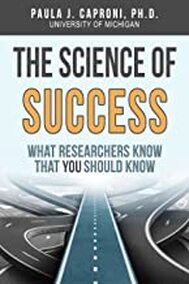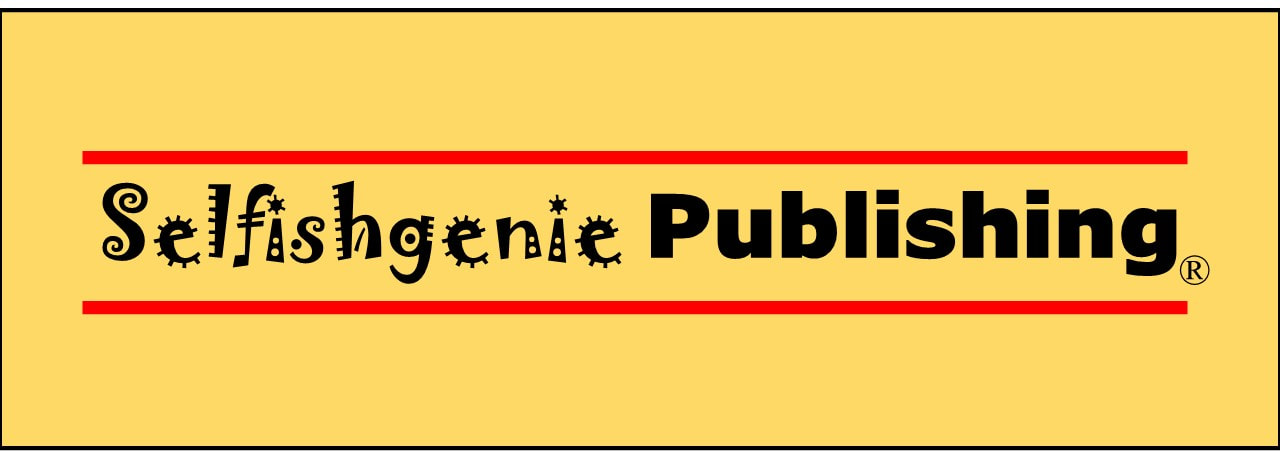|
All book reviews posted on the Selfishgenie Publishing blog page are the opinions of the reviewers, not those of the Selfishgenie management. The Secret Of My Success Is ...... Reading This Book  I’m not a great one for “self-improvement” books. Firstly, the only thing they really seem to improve is the author’s bank balance and, secondly, if they have changed someone’s life then there is a strong contextual element behind that change which means it's unique to that person. If the context is unique to an individual then what is advocated may not work for anyone else, so why buy a self-improvement book if it’s not going to work for me? However, “The Science of Success: What Researchers Know That You Should Know”, by Paula J Caproni Ph.D is different. Just to establish Dr Caproni’s credentials, she is a Professor of Business Studies in the Management and Organizations Department at the Ross School of Business at the University of Michigan. In academic terms, she is no lightweight because the University of Michigan is in the top 2% of universities in the world. What is different about this book is that it is based on decades of research by psychologists into how successful people behave that makes them more successful than others. It identifies the behaviours they have in common, which means that they aren’t unique or constrained by a particular set of circumstances. What is even more important is that these behaviours can, by and large, be learnt and applied by anyone. OK, if I don’t normally read books like this, how come I stumbled across it? You can blame Covid-19 for that. Because of the restrictions on movement placed on us by our government’s attempts to deal with the pandemic, I was filling some of my time doing a lot of on-line learning. Having just finished one short course I was looking for my next and I stumbled across this course, which bears the same title as the book. I signed up for the course and studied week one, at the end of which I was informed that there was some optional reading and it was this book. It wasn’t expensive (£3.78 on Kindle) so I bought it. "these behaviours can, by and large, be learnt "  As it turns out, if I’d just read the book I didn’t need to do the course as well, because the course is really just Dr Caproni telling the student the same stuff as is in the book. But I didn’t know that until I signed up for the course and what I start I try to finish. Which, it turns out, is an important behaviour when it comes to success. In reading the book I realised that I already did some of the things discussed – life-long learning is another one of the behaviours of the successful and my Covid inspired learning is part of that. That probably accounts, in part, for some of the success I have had in my life. I also realised that I had, at times, sabotaged my own endeavours by behaving in ways that got in the way of achieving success. Looking back over my life that also accounted for a lot. But this is a book review, not a confessional, so I won’t go into that. A common phrase often heard these days is “Change one thing!”. The good news is that, using this book, you can change one thing and see how it works out. You don’t have to swallow the whole book, you can make changes incrementally and see how they affect your life before you change something else. "Which, it turns out, is an important behaviour when it comes to success."  Besides, if you try to change everything at the same time you will probably overload yourself and that is going to hinder more than it will help. If that sounds like a long road to travel, you are right. It turns out that the ability to delay gratification (a dying personality trait in this world of instant gratification) is another behaviour that promotes success. So, if you don’t want to take the long road, you may be doomed to be less than successful. But the good news is that we are also encouraged to give something up, or modify the way we do it, in order to make time for us to do the new things we want to do. For example, if you decide you want to take more exercise, you might need to sacrifice some of your reading time in order to accommodate it. But that doesn’t mean giving up books, because you can listen to an audio book while exercising. Time management of that sort features quite heavily in some sections of the book. The very first thing Dr Caproni advises is to identify what success actually means for you (or, in this case, me). It may mean becoming a multi-billionaire, but it doesn’t have to. However you define success it has to be what you want and what you value, not what someone wants for you (or from you). So, some people will define it as being a multi-billionaire, but others may just define it as having a more satisfying job, being a valued member of a team, getting a promotion at work or having a happy family life. It doesn’t matter how anyone else measures success, it is how you measure it that’s important. "It doesn’t matter how anyone else measures success, it is how you measure it that’s important." In six chapters Dr Caproni takes us through the research into four different areas of behaviour that mark out successful people and how we, the reader, can learn those behaviours for ourselves and apply them in our lives.  Yes, there is a practical element to this. Reading about the research won’t change a thing for anyone. Only by making changes to our lives will we become more successful. To use a phrase I learned many years ago “If you always do what you always did, you’ll always get what you always got!” (Henry Ford) Or, to misquote Albert Einstein (who probably didn’t say it anyway) “Insanity is doing the same thing over and over and expecting a different outcome each time.” Within the book Ch 1 is a general introduction; Ch 2 deals with mindsets and how focusing only on results can constrain our lives; Ch 3 is about being or becoming an expert; Ch 4 focuses on motivation (yes, you do have to be motivated); Ch 5 is about the importance of relationships and Ch 6 is about creating an action plan to move yourself in the direction you wish to travel. “If you always do what you always did, you’ll always get what you always got!” (Henry Ford) Dr Caproni draws on real world examples of people who have made great strides in being successful. Some of the names will be familiar, some less so and at least one, a Chinese child, you will probably never have heard of. But each example used, demonstrates a different aspect of the behaviours that Dr Caproni is teaching. No promises are made of overnight success or achieving great wealth. It isn’t that sort of book. But within its pages are things that everyone (and I do mean everyone) can learn that will make them more successful and, importantly, happier people.  Because happiness and success usually go hand in hand; or so Dr Caproni tells us. Before you say that there are many successful people that aren’t happy, I have to both agree with you and disagree with you. Because you don’t know how those people measure success. They may never be happy because they define success as being the richest, the prettiest, the greatest (whatever) or something else. Which means they will never be happy if they aren’t that thing. Because there can only ever be one of those things with “est” at the end of the word. There can only be one richest person, one greatest athlete, one best actor etc and if that is your goal then you aren’t going to be happy if you fail to achieve it. But for those whose success is measured without being one of those things, then happiness is more likely. Again, Dr Caproni tells us why that should be and, generally, it has nothing to do with the size of your bank balance or being numero uno in whatever field you are in. "Because happiness and success usually go hand in hand" Considering that this book is based on psychological research, it is very easy to read. Dr Caproni has chosen her language with the lay reader in mind. There isn’t much in the way of jargon but, occasionally, Dr Caproni does rather labour a point; however, that is a very minor criticism. And, if you don’t want to buy the book, you can still sign up for the course for free and learn the lessons that way. It is presented entirely as video sessions, which some people might prefer. I have no hesitation about recommending “The Science of Success: What Researchers Know That You Should Know”, by Paula J Caproni Ph.D, to anyone who wants to make more of their life. To find out more about the book, click on the book’s cover image at the beginning of this blog. To read more book reviews like this, sign up for our newsletter so you never miss one. Just click on the button below.
0 Comments
Leave a Reply. |
AuthorThis blog is compiled and curated by the Selfishgenie publishing team. Archives
June 2025
|


 RSS Feed
RSS Feed